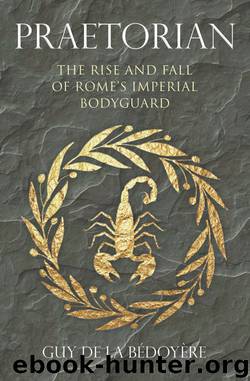Praetorian by Guy de la Bédoyère & Malk Williams

Author:Guy de la Bédoyère & Malk Williams [Bédoyère, Guy de la & Williams, Malk]
Language: eng
Format: epub
ISBN: 9781543663594
Amazon: 1543663591
Publisher: Audible Studios on Brilliance Audio
Published: 2017-10-24T00:00:00+00:00
CHAPTER 8
CONCORDIA EXERCITUUM
(98–180)
The Praetorian Guard had played an enormously important part in the imperial politics of the first century AD. This also coincided with our richest body of written evidence for the Roman Empire. The second century is entirely different. A succession of strong and competent emperors contributed to a period of unprecedented stability for the Roman world. In this context, the praetorians had no opportunity or, it seems, wish to play any part in toppling or appointing emperors. The written canon of evidence also dramatically declines in quantity and quality, leaving us principally with only a series of much later biographies of the emperors, and the epitome of Cassius Dio. The picture that emerges is of a Praetorian Guard that took part in imperial campaigns, such as Trajan’s Dacian wars, and also continued to operate as a police force in Italy.
D
OMITIAN’S UNPOPULARITY AMONGST THE wider public meant that his assassination caused little or no disquiet. Only the army seems to have been bothered. His use of praetorians to help fight the Dacian war meant that their first response to news of his death was to demand his deification. The only factor that prevented an immediate military uprising in Rome was the lack of any obvious leader.1 In the event, that position was filled by the prefect Casperius Aelianus in a brief return to the days when the praetorians shaped the course of Roman history, but he took his time before acting.
Marcus Cocceius Nerva’s accession as emperor was clearly a stopgap. In the summer of 96 Nerva was approaching his sixty-fifth birthday and he had no children. There was therefore no question of a new dynasty, though he did have relatives. The ageing new emperor reappointed Casperius Aelianus to the praetorian prefecture, probably to calm down the Guard and the rest of the army. It seems to have worked to begin with. Nerva issued coins in gold, silver and brass, showing two clasped hands grasping a legionary standard with the legend CONCORDIA EXERCITVVM, ‘Harmony of the Armies’.2
Nerva emptied the prisons of those accused of treason, condemned informers, returned property that had been appropriated by Domitian, and sought out sound advisers. Despite this, he was still the victim of plots, his age at accession being the main reason for unrest. The first was led by a senator called Calpurnius Crassus. An informer told Nerva what was happening, so Nerva outfaced the plotters by providing them with a chance to kill him, even handing them weapons. This was followed by another, led by Casperius Aelianus, who had whipped up the praetorians to demand the execution of his immediate predecessor, Titus Petronius Secundus, and Domitian’s freedman Parthenius.3 He next encouraged the praetorians to mutiny. Nerva’s considerable personal courage won out again, this time when he bared his neck and invited them to slit it. He survived, but at the expense of Petronius and Parthenius. Nerva knew he was vulnerable and came up with a solution. He selected a promising soldier, a Spaniard called Marcus Ulpius Traianus (known to us as Trajan), and adopted him as his heir.
Download
This site does not store any files on its server. We only index and link to content provided by other sites. Please contact the content providers to delete copyright contents if any and email us, we'll remove relevant links or contents immediately.
| Africa | Americas |
| Arctic & Antarctica | Asia |
| Australia & Oceania | Europe |
| Middle East | Russia |
| United States | World |
| Ancient Civilizations | Military |
| Historical Study & Educational Resources |
The Mysteries of Mithra by Cumont Franz(1352)
The Fall of Carthage by Adrian Goldsworthy(1302)
Sacred Britannia: The Gods and Rituals of Roman Britain by Aldhouse-Green Miranda(1148)
Letters from a Stoic (Classics) by Seneca(1028)
The Ghosts of Cannae: Hannibal and the Darkest Hour of the Roman Republic by Robert L. O'Connell(979)
Selected Political Speeches by Marcus Tullius Cicero(971)
The Satyricon by Petronius(971)
Fall of the Roman Republic (Penguin Classics) by Plutarch(962)
The Poison King: The Life and Legend of Mithradates, Rome's Deadliest Enemy by Adrienne Mayor(960)
Rubicon: The Triumph and Tragedy of the Roman Republic by Tom Holland(938)
Rome's Gothic Wars: From the Third Century to Alaric by Michael Kulikowski(932)
Hadrian and the Triumph of Rome by Everitt Anthony(880)
In Defence of the Republic by Cicero(863)
The Roman History by Cassius Dio(863)
Delphi Complete Works of Cicero by Cicero(815)
Letters from a Stoic by Seneca(810)
The Spartacus War by Strauss Barry(797)
Marcus Aurelius by John Sellars(792)
The Twelve Caesars (Penguin Classics) by Suetonius & Robert Graves(773)
